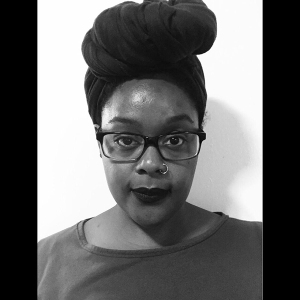By Erica Hughes
…you begin to understand yourself
as rendered hypervisible in the face of such [racist] language.
Language that feels hurtful is intended to exploit
all the ways that you are present. Your alertness, your
openness, and your desire to engage actually demand
your presence, your looking up, your talking back, and,
as insane as it is, saying please.
—Claudia Rankine from her poetry collection Citizen: An American Lyric
Last night, I told my roommate over In N Out that I never feel free—especially at school. I think this may have come as a shock to her, a Chicana from the southside of Chicago, because she too has faced the injustices of growing up not white in America but has never felt not free. Over burgers and fries, I failed to eloquently explain to her that when I’m at school or church or at the grocery store I am always aware of this cross of blackness that I bear, the constant scrutiny of being black—Are you loud? Are you ghetto? Are you abrasive too? And if you are none of these things, will you be our token? Our prize nigger that shows that we, too, can tame blackness?
This cross of blackness is heavy when splattered against a sheet of whiteness—there’s nowhere to hide.
*****
My mother grew up in East Palo Alto, California. Before it was gentrified by rich white people with the rise of Facebook, East Palo Alto was predominantly poor and black. Almost every time I speak to my mother, she tells me a story about her childhood home, about the violence she faced, about being bused to a white school, about how she was put in gifted classes, and about how she was the only person of color in her classes. Despite many hardships, my mother is now the supervisor over a team that manages the computer systems of an entire county. Yet she still turns over her memories of the inhumane ways she and the people around her lived.
Last Sunday, she said to me “Where I grew up, we were scared. Scared to go outside. Scared to go to school. We stayed inside all the time because we was scared. But it was our own people killing and hurting each other—all that black on black crime.”
I hurriedly interrupted: “No, black on black crime is a myth. People kill people whom with they live in close proximity. Plus, think about it, Black people are plagued with generational trauma—the white slave owners beat us, the police kill us, and we beat and kill ourselves. That violence is a direct effect of slavery.”
She replied, “How come the media, no one on the news, puts it like that—explains it that clearly the ramifications of slavery.”
I had no response for my mother, no answer for the weight of her own heavy cross of blackness.
*****
A friend who found God while he was in prison once said to me, “Jesus is a G.” I laughed at him, shaking my head in agreement.
A couple of weeks later, I read through Mark’s gospel and was entertained and smitten by the Jesus who Mark depicts: Jesus—friend of tax collectors, of the sick, of bleeding women, of promiscuous women, of children. Today, tax collectors are drug dealers; the sick are dope fiends; the women are single mothers; and the children are the black girls with ponytails and edges sticking straight up and black little boys with their shirts off riding bikes and scooters and teenage boys playing basketball, mouthing off at each other, and teenage girls with cellphones pressed to their ears and hands on their hips.
Imagine Jesus posted up at a table with a man in sagging pants and a black wife-beater on, a do-rag wrapped around his head to protect the waves in his hair, and with jays on his feet. Imagine Jesus playing double-dutch in the middle of the street with little girls whose ponytails point straight up at heaven. Imagine Jesus hugging and kissing shirtless little black boys. Imagine Jesus eating the food of a mother on food stamps.
*****
Because society is dominated by whiteness, everyone who is not black tries to distance themselves as far away from the thick weight of blackness as best as they can. But those who are black, find themselves smothered by social biases—nailed to a cross as children and hanging until death.
Jesus is the only one unafraid of black people, and the only place of freedom that I’ve found from this is at the foot of his cross—where this cross of blackness, built by the social construct of whiteness, is laid at his feet. At the foot of his cross, Jesus picks up the denigrated bodies of black folk, the dead dignity of a once enslaved people, nappy-headed children, black men and women, babymamas and babydaddys and carries our thick, black cross.
Erica Hughes is an alumna of Dordt College, is working toward her MFA in Creative Writing, Poetry at California State University, Fresno and teaches freshmen composition there as well. More importantly, Erica like reads too much for her own good.

